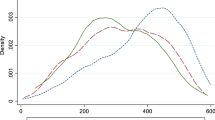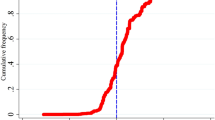Abstract
This study analyzes the effects of several factors related to high school, such as the kind of school (public or private), the type of education (general or vocational), school location and peers on undergraduate performance from students of the University of Barcelona (Spain). Particular attention is given to the functional form and to the collection of “unobservables”. Empirical results show that variables related to high school, such as having attended in a private religious school or peer effects of their school contemporaries, are determinant in university final grades. In addition, students’ ability, some household’s characteristics and the 1990 Education Act are also important.

Similar content being viewed by others
References
Albert, C. (2000). Higher education demand in Spain: The influence of labour market signals and family background. Higher Education, 40, 147–162.
Altonji, J. G., Elder, T. E., & Taber, C. E. (2005). Selection on observed and unobserved variables: Assessing the effectiveness of catholic schools. Journal of Political Economy, 113(1), 151–184.
Angrist, J., Chernozhukov, V., & Fernández-Val, I. (2006). Quantile regression under misspecification, with an application to the U.S. wage structure. Econometrica, 74(2), 539–564.
Behrman, J. R., & Rosenzweig, M. R. (2002). Does increasing women’s schooling raise the schooling of the next generation? The American Economic Review, 92(1), 323–334.
Calvó-Armengol, A., Patacchini, E., & Zenou, Y. (2005). Peer effects and social networks in education and crime. CEPR Discussion Papers 5244.
Epple, D., Figlio, D., & Romano, R. (2004). Competition between private and public schools: Testing stratification and pricing predictions. Journal of Public Economics, 88, 1215–1245.
Gibbons, S., & Telhaj, S. (2005). Peer effects and pupil attainment: Evidence from secondary school transition. Discussion Papers Centre for Economic Performance, London School of Economics.
Grant, D. (2007). Grades as information. Economics Education Review, 26(2), 201–214.
Greene, J. P. (2001). High school graduation rates in the United States. New York: Center for Civic Innovation.
Hansen, K. T., Heckman, J. J., & Mullen, K. J. (2004). The effect of schooling and ability on achievement test scores. Journal of Econometrics, 121, 39–98.
Hanushek, E. A. (1979). Conceptual and empirical issues in the estimation of educational production functions. Journal of Human Resources, 14(3), 351–388.
Hanushek, E. A., Kain, J. F., Markman, J. M., & Rivkin, S. G. (2003). Does peer ability effect student achievement? Journal of Applied Econometrics, 18(5), 527–544.
Haveman, R., & Wolfe, B. (1995). The determinants of children’s attainments: a review of methods and findings. Journal of Economic Literature, 33(4), 1829–1878.
Horowitz, J. B., & Spector, L. (2005). Is there a difference between private and public education on college performance? Economics of Education Review, 24, 189–195.
Krueger, A. B. (1999). Experimental estimates of education production functions. The Quarterly Journal of Economics, 114(2), 497–532.
Manning, W. G., & Mullahy, J. (2001). Estimating log models: To transform or not to transform? Journal of Health Economics, 20(4), 461–494.
Manski, C. F. (1993). Identification of endogenous social effects: The reflection problem. Review of Economic Studies, 60, 531–542.
Mora, J. G. (1997). Equity in Spanish higher education. Higher Education, 33, 233–249.
Sacerdote, B. I. (2001). Peer effects with random assignment. Quarterly Journal of Economics, 116, 681–704.
Smith, J., & Naylor, R. (2005). Schooling effects on subsequent university performance: Evidence for the UK university population. Economics of Education Review, 24, 549–562.
Zimmerman, D. J. (2003). Peer effects in academic outcomes: Evidence from a natural experiment. The Review of Economics and Statistics, 85(1), 9–23.
Acknowledgements
The authors would like to thank the Servei de Gestió Acadèmica of the University of Barcelona for supplying the data and Ms. Amparo Asensi. Any errors, however, are attributable to the authors. Toni Mora gratefully acknowledges the financial support of the Spanish Ministry of Science and Technology by means of grant SEJ2006-01161/ECON.
Author information
Authors and Affiliations
Corresponding author
Rights and permissions
About this article
Cite this article
Mora, T., Escardíbul, JO. Schooling effects on undergraduate performance: evidence from the University of Barcelona. High Educ 56, 519–532 (2008). https://doi.org/10.1007/s10734-007-9108-y
Received:
Accepted:
Published:
Issue Date:
DOI: https://doi.org/10.1007/s10734-007-9108-y




